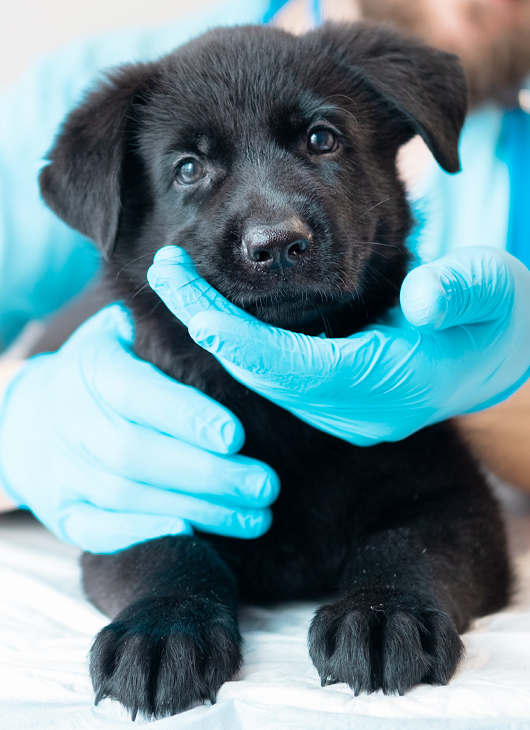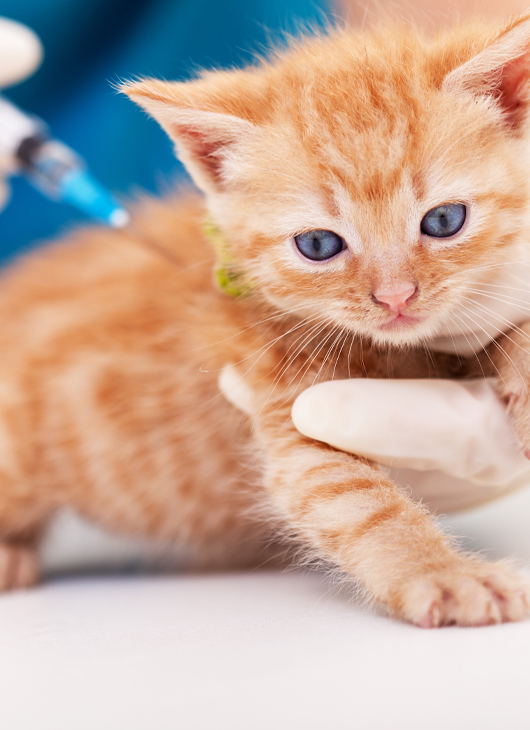Vaccinations
Vaccinations play an extremely important role in keeping your pet healthy and free from life threatening diseases.
KEEPING YOUR DOG SAFE
Dog Vaccinations
We vaccinate dogs against diseases such as canine parvovirus, canine distemperviurus, hepatitis and leptospirosis. These diseases can be life threatening to your pet.
Parvovirus and leptospirosis are still commonly seen and diagnosed despite a significant increase in pet vaccinations in the last decade. Both of these diseases can be catastrophic if your pet gets them. There is no specific cure for these diseases so if they are unwell and hospitalised with these diseases intensive supportive therapy is the treatment given. The old phrase prevention is better than the cure is very accurate in this case!
Vaccinations can be given to puppies from 6 weeks of age and at least one more vaccination needs to be given 4 weeks later. It’s important that all vaccinations are given by a Veterinary Surgeon and as there are different vaccination brands which have different protocols it’s extremely important to contact your vet as soon as you get a new puppy to discuss what vaccination schedule your puppy will need.
Canine Cough is another disease your dog can pick up that we can vaccinate against. Canine Cough is not a life threatening disease but it can be quite uncomfortable for your pet if they get it causing restless and sleepless nights for everyone in the household. Canine cough is extremely contagious so if your dog is a sociable dog or if you take them to the park it is definitely important to vaccinate them against it.

Vaccinations can be given to puppies from 6 weeks

KEEPING YOUR DOG SAFE
Dog Vaccinations
We vaccinate dogs against diseases such as canine parvovirus, canine distemperviurus, hepatitis and leptospirosis. These diseases can be life threatening to your pet.
Parvovirus and leptospirosis are still commonly seen and diagnosed despite a significant increase in pet vaccinations in the last decade. Both of these diseases can be catastrophic if your pet gets them. There is no specific cure for these diseases so if they are unwell and hospitalised with these diseases intensive supportive therapy is the treatment given. The old phrase prevention is better than the cure is very accurate in this case!
Vaccinations can be given to puppies from 6 weeks of age and at least one more vaccination needs to be given 4 weeks later. It’s important that all vaccinations are given by a Veterinary Surgeon and as there are different vaccination brands which have different protocols it’s extremely important to contact your vet as soon as you get a new puppy to discuss what vaccination schedule your puppy will need.
Canine Cough is another disease your dog can pick up that we can vaccinate against. Canine Cough is not a life threatening disease but it can be quite uncomfortable for your pet if they get it causing restless and sleepless nights for everyone in the household. Canine cough is extremely contagious so if your dog is a sociable dog or if you take them to the park it is definitely important to vaccinate them against it.

Vaccinations can be given to Kittens from 8 weeks
KEEPING YOUR CAT SAFE
Cat Vaccinations
We can protect our cats by vaccinating them against what is commonly known as cat flu, against feline panleukopenia and also against feline leukemia virus (FeLV).
Cat flu is caused by the feline herpesvirus and feline calicivirus. These viruses result in upper respiratory infections that range from mild to severe flu like symptoms. Some cats can however become dehydrated and malnourished and require hospitalisation. Some cats can also develop eye ulcers which are very painful and in worst cases can even result in them losing sight or losing their eye. These viruses are spread from infected cats in nasal and oral secretions and can also be spready from infected mothers to their kittens so vaccination to prevent both of these viruses is very important.
Feline panleukopenia can cause mild disease with a mild fever and diarrhoea but can often progress to severe disease resulting in vomiting, diarrhoea, dehydration and can be acutely life threatening. As with parvovirus in dogs there is no specific treatment and intensive supportive therapy is the treatment given meaning that again prevention is far better than the cure!
Feline leukemia virus is a very serious virus that cats can get from close contact other cats. It is spread from infected cats in their saliva, tears, urine, milk and faeces. Cats with this virus can have some non specific symptoms including anaemia, vomiting and diarrhoea and can also become unwell from other illness as they have a weak immune system. Feline leukemiavirus, in cats that can’t fight the virus, will shorten their life expectancy. Some cats will be unwell with recurrent infections due to their weak immune system while others can go on to develop cancer. It is really important to vaccinate your cat against this deadly virus!

KEEPING YOUR CAT SAFE
Cat Vaccinations
We can protect our cats by vaccinating them against what is commonly known as cat flu, against feline panleukopenia and also against feline leukemia virus (FeLV).
Cat flu is caused by the feline herpesvirus and feline calicivirus. These viruses result in upper respiratory infections that range from mild to severe flu like symptoms. Some cats can however become dehydrated and malnourished and require hospitalisation. Some cats can also develop eye ulcers which are very painful and in worst cases can even result in them losing sight or losing their eye. These viruses are spread from infected cats in nasal and oral secretions and can also be spready from infected mothers to their kittens so vaccination to prevent both of these viruses is very important.
Feline panleukopenia can cause mild disease with a mild fever and diarrhoea but can often progress to severe disease resulting in vomiting, diarrhoea, dehydration and can be acutely life threatening. As with parvovirus in dogs there is no specific treatment and intensive supportive therapy is the treatment given meaning that again prevention is far better than the cure!
Feline leukemia virus is a very serious virus that cats can get from close contact other cats. It is spread from infected cats in their saliva, tears, urine, milk and faeces. Cats with this virus can have some non specific symptoms including anaemia, vomiting and diarrhoea and can also become unwell from other illness as they have a weak immune system. Feline leukemiavirus, in cats that can’t fight the virus, will shorten their life expectancy. Some cats will be unwell with recurrent infections due to their weak immune system while others can go on to develop cancer. It is really important to vaccinate your cat against this deadly virus!
Come chat to us at Donnybrook Vets
We can advise you on a vaccination schedule for your pet!
Pet Health Plan
Our Pet Health Plan is a great way to look after your pet’s preventive healthcare needs, as well as helping to reduce the cost of consultations & procedures
How Can We Help?
Like humans pets don’t only get sick Monday – Friday 9-5!
At Donnybrook Vets there will always be an option for your pet to be seen and treated by a Veterinary Surgeon out of hours!
Pet Health Plan
Our Pet Health Plan is a great way to look after your pet’s preventive healthcare needs, as well as helping to reduce the cost of consultations & procedures
How Can We Help?
Like humans pets don’t only get sick Monday – Friday 9-5!
At Donnybrook Vets there will always be an option for your pet to be seen and treated by a Veterinary Surgeon out of hours!
